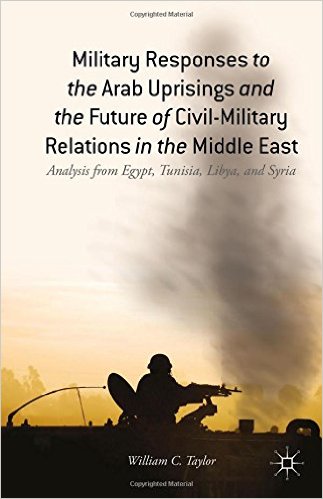 Author: William C. Taylor
Author: William C. Taylor
Publisher: Palgrave Macmillan – 252 pages
Book Review by: Paiso Jamakar
On December 17, 2010, at around 11:30 a.m., a 26-year-old street vendor named Mohamed Bouazizi set himself on fire in Sidi Bouzid, a highly corrupt rural town with 30 percent unemployment, in Tunisia. He had started his workday that morning at about 8 a.m. About two hours later, the local police began harassing him, as they had done before, asking him for a vendor’s permit. According to the head of Sidi Bouzid’s state office for employment and independent work, no permit is needed to sell from a cart.
Bouazizi did not have the funds to bribe police officials. As a matter of fact the night before he had borrowed the $200 needed to buy fruits to sell on his cart the next morning. Two of Bouazizi’s siblings accused authorities of attempting to extort money from their brother, and one of his sisters was quoted as saying to Reuters: “what kind of repression can you imagine it takes for a young man to do this (burn himself)? A man who has to feed his family by buying goods on credit when they fine him…and take his goods.”
Family members had said that Bouazizi was publicly humiliated when a 45-year-old female municipal official named Faida Hamdi slapped him in the face, spat at him, kicked and beat him, confiscated his wares and electronic weighting scales, and tossed aside his produce cart. He was now unable to make money to feed his family.
Bouazizi, angered and frustrated by all this, ran to the governor’s office to complain and to ask for his scales back. The governor refused to see or listen to him, even after Bouazizi was quoted as saying “if you don’t see me, I’ll burn myself.” The street vendor then got a can of gasoline from a nearby has station and returned to the governor’s office. Still not able to see the governor, he stood in the middle of traffic and shouted: “how do you to expect me to make a living?” He then doused himself with gasoline, and lighted himself on fire.
This single event, as related in Wikipedia, forced then Tunisia’s President Zine El Abidine Ben Ali, who had been in power for 23 years, to step down on January 14, 2011, less than a month after the self-immolation of Mohammed Bouazizi. This incident, which showcased government repression, autocracy, and abuse of the common man, sparked mass protests nationwide and was the beginning of the Tunisian Revolution.
This was also the beginning of the Arab Awakening in numerous Middle Eastern nations. By the end of 2012, uprisings had overthrown the rulers of Egypt, Libya, and Yemen as well, and mass protests against the governments had broken out in Algeria, Bahrain, Iraq, Jordan, Kuwait, and Morocco. Minor protests had also occurred in Djibouti, Mauritania, Oman, the Palestinian territories, Saudi Arabia, and Western Sahara.
This sort of signature event is simply unpredictable, writes the author of this book William C. Taylor, just as were the Iranian Revolution of 1979 that deposed the Pahlavi dynasty, the fall of the Soviet Union in 1989, and the attack on the Twin Towers on September 11, 2001.
While most of the regimes survived, some of them crumbled. The reasons were many, including autocratic, tiresome rulers and high levels of unemployment in stagnant economies. The role of the social media in spreading news and gathering support primarily among the youth is one of the key factors behind the success of mass protest in overthrowing repressive leaders.
This book takes a look at one other important reason why uprisings have been successful: the role of the military. Taylor writes: “As anyone who studies the Arab Middle East will tell you, the role of Arab militaries has invariably been at the center of Middle Eastern politics. As a rule, the armed forces have long served as the most powerful domestic institutions across the region. The host of coups in the 1950s and 1960s, the proliferation of Arab leaders with military credentials, and the oft-highlighted narrative of Israel aggression, and the vast resources committed to defense spending have afforded Arab militaries roles of outsized prominence in domestic and international affairs.”
He goes on to state that the militaries have played a pivotal role in the Arab uprisings that have occurred since 2011. He takes a look at their roles in Egypt, Libya, Syria, and Tunisia in this book within a historical context, as well as how the United States has influenced Arab decisions. We give you an overview below of what you will find in this book:
- Introduction
- The Past and Future of Arab Civil-Military Relations
- Modeling Military Decision Making in Periods of Social Unrest
- The Tunisian Military’s “Ambitious Support” of the Arab Awakening
- The Syrian Military’s “Fervent Support” of Bashar al-Assad
- The Egyptian Military’s “Reluctant Support” of the Arab Awakening
- The Libyan Military’s “Fractured Support” of Muammar Gaddafi
- U.S. Influence on Arab Decision Making in Times of Social Unrest
- Arbiters of Social Unrest: The Future of Arab Civil-Military Relations
You will find in reading this book that the roles the leaders of military forces played, varied a great deal. Some of the military forces have stood with the protesters and overthrown the old regimes; others have supported those regimes and enabled them to remain in power. Some militaries have remained unified while others have fractured. Learn how and why.
Author:
William C. Taylor is a professional in the U.S. intelligence community and a former Assistant Professor of American foreign policy at the United States Military Academy at West Point. As a former military advisor to an Iraqi infantry battalion, he has firsthand knowledge of Arab military thinking







